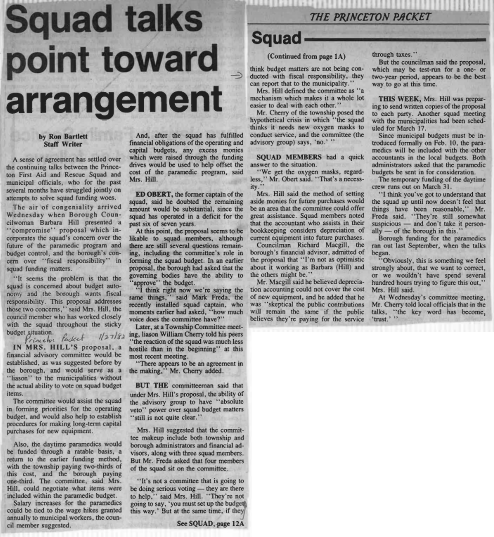
Princeton Packet
27 January 1982
Squad talks point toward arrangement
by Ron Bartlett
Staff Writer
A sense of agreement has settled over the continuing talks between the Princeton First Aid and Rescue Squad and municipal officials, who for the past several months have struggled jointly on attempts to solve squad funding woes.
The air of congeniality arrived Wednesday when Borough Councilwoman Barbara Hill presented a “compromise” proposal which incorporates the squad’s concern over the future of the paramedic program and budget control, and the borough’s concern over “fiscal responsibility” in squad funding matters.
“It seems the problem is that the squad is concerned about budget autonomy and the borough wants fiscal responsibility. This proposal addresses those two concerns,” said Mrs. Hill, the council member who has worked closely with the squad throughout the sticky budget situation.
IN MRS. HILL’S proposal, a financial advisory committee would be established, as was suggested before by the borough, and would serve as a “liaison” to the municipalities without the actual ability to vote on squad budget items.
The committee would assist the squad in forming priorities for the operating budget, and would also help to establish procedures for making long-term capital purchases for new equipment.
Also, the daytime paramedics would be funded through a ratable basis, a return to the earlier funding method, with the township paying two-thirds of this cost, and the borough paying one-third. The committee, said Mrs. Hill, could negotiate what items were included within the paramedic budget.
Salary increases for the paramedics could be tied to the wage hikes granted annually to municipal workers, the council member suggested.
And, after the squad has fulfilled financial obligations of the operating and capital budgets, any excess monies which were raised through the funding drives would be used to help offset the cost of the paramedic program, said Mrs. Hill.
ED OBERT, the former captain of the squad, said he doubted the remaining amount would be substantial, since the squad has operated in a deficit for the past six of seven years.
At this point, the proposal seems to be likable to squad members, although there are still several questions remaining, including the committee’s role in forming the squad budget. In an earlier proposal, the borough had asked that the governing bodies have the ability to “approve” the budget.
“I think right now we’re saying the same things,” said Mark Freda, the recently installed squad captain, who moments earlier had asked, “how much voice does the committee have?’ ‘
Later, at a Township Committee meeting, liaison William Cherry told his peers “the reaction of the squad was much less hostile than in the beginning” at this most recent meeting.
“There appears to be an agreement in the making,” Mr. Cherry added.
BUT THE committeeman said that under Mrs. Hill’s proposal, the ability of the advisory group to have “absolute veto” power over squad budget matters “still is not quite clear.”
Mrs. Hill suggested that the committee makeup include both township and borough administrators and financial advisors. along with three squad members. But Mr. Freda asked that four members of the squad sit on the committee.
“It’s not a committee that is going to be doing serious voting — they are there to help,” said Mrs. Hill. “They’re not going to say, ‘you must set up the budget this way.” But at the same time, if they
See SQUAD, page 12A
Squad
(Continued from page 1A)
think budget matters are not being conducted with fiscal responsibility, they can report that to the municipality.”
Mrs. Hill defined the committee as “a mechanism which makes it a whole lot easier to deal with each other.”
Mr. Cherry of the township posed the hypothetical crisis in which “the squad thinks it needs new oxygen masks to conduct service, and the committee (the advisory group) says, ‘no.’
SQUAD MEMBERS had a quick answer to the situation.
“We get the oxygen masks, regardless.” Mr. Obert said. “That’s a necessity.”
Mrs. Hill said the method of setting aside monies for future purchases would be an area that the committee could offer great assistance. Squad members noted that the accountant who assists in their bookkeeping considers depreciation of current equipment into future purchases.
Councilman Richard Macgill, the borough’s financial advisor, admitted of the proposal that “I’m not as optimistic about it working as Barbara (Hill) and the others might be.”
Mr. Macgill said he believed depreciation accounting could not cover the cost of new equipment, and he added that he was “skeptical the public contributions will remain the same if the public believes they’re paying for the service
through taxes.”
But the councilman said the proposal, which may be test-run for a one- or two-year period, appears to be the best way to go at this time.
THIS WEEK, Mrs. Hill was preparing to send written copies of the proposal to each party. Another squad meeting with the municipalities had been scheduled for March 17.
Since municipal budgets must be introduced formally on Feb. 10, the paramedics will be included with the other accountants in the local budgets. Both administrators asked that the paramedic budgets be sent in for consideration.
The temporary funding of the daytime crew runs out on March 31.
“I think you’ve got to understand that the squad up until now doesn’t feel that things have been reasonable.” Mr. Freda said. “They’re still somewhat suspicious — and don’t take it personally — of the borough in this.”
Borough funding for the paramedics ran out last September, when the talks began.
“Obviously, this is something we feel strongly about, that we want to correct, or we wouldn’t have spend several hundred hours trying to figure this out,” Mrs. Hill said.
At Wednesday’s committee meeting, Mr. Cherry told local officials that in the talks, “the key word has become, ‘trust.’ “